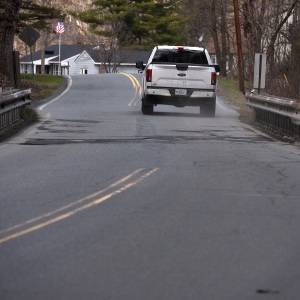Cross-border deer poaching case ensnares 6 suspects in Vt., NH
| Published: 04-30-2022 6:02 AM |
NORWICH — Five Windsor County men face a combined 78 criminal charges in Vermont after the alleged poaching of 14 deer. Several, along with a Sunapee man, face additional criminal charges in New Hampshire, where officials said they have evidence that four bucks were taken illegally.
“Poaching is not hunting. Poaching is an illegal activity,” said Sgt. Robert Currier from Vermont Fish and Wildlife. “It is the mission of the warden service to pursue potential wrongdoers like the ones apprehended.”
Casey Thayer, of Hartford, told officers he’d shot and killed a 10-pointer in Vermont after already having taken the one permitted by law, then driving it over the state line to have it tagged in Lyme, according to an affidavit from Currier.
When investigators conducted forensics on Thayer’s cellphone, they found text messages, videos, photographs and information logged in an application called onX Hunt that suggested more deer had been taken illegally and implicated the other men charged, Currier said.
Thayer, 27; Zackery Baxter, 26, of Sharon; Jeffrey Degrasse, 26, of Hartford; Kobe Labonte, 22, of White River Junction; and Patrick Whitcomb, 24, of Hartford, appeared in court on Tuesday. They faced charges including taking deer in closed season; transportation of illegal deer; failure to report big game; obstruction of justice; and feeding deer. Vermont wardens recovered evidence such as packaged venison, a bone saw and 5-gallon buckets with blood inside from Thayer’s and Whitcomb’s residences, which authorities say suggests deer were processed for consumption.
Fish and Wildlife officials later seized the antlers from the 10-point buck from David Pearson Taxidermy in Hartland, where the owner told them the antlers were sold by Thayer but dropped off by Baxter, according to the affidavit.
Conservation officers were not able to prove that deer were taken with bait, but they do have evidence that some of the accused placed bait on the landscape, Currier said.
Thayer faces charges of providing false information to a police officer because of a sworn statement that he later admitted contained lies. He and Baxter face charges of obstruction of justice because they are suspected of working together to hide evidence after Thayer’s initial interview with law enforcement, Currier said.
Article continues after...
Yesterday's Most Read Articles
Thayer pleaded guilty to taking a deer in closed season, possessing illegal deer and transporting illegal deer. He will be fined $1,821, pay $500 in restitution for the deer, forfeit his crossbow and complete nine to 10 days of work crew service.
Labonte pleaded guilty to taking deer in closed season and will be fined $607.
Whitcomb pleaded guilty to taking deer in closed season and possession of illegal deer. He will be fined $1,214, pay $500 in restitution for the deer and forfeit his crossbow.
Baxter and Degrasse pleaded not guilty to all charges.
On conviction, poachers lose the privilege to fish, hunt and trap for three years in Vermont, and by extension, in the 48 states that participate in the Interstate Wildlife Compact, including New Hampshire.
Baxter, Thayer, Degrasse and Degrasse’s father, who is also named Jeffrey Degrasse and lives in Sunapee, face additional charges in New Hampshire. So far, only Thayer has pleaded guilty to charges in New Hampshire. He faces fines of over $1,300 for charges including unsworn falsification and transportation of deer by nonresidents, according to court documents.
“There was a good concerted effort on both agencies’ parts,” said Heidi Murphy, the New Hampshire Fish and Game conservation officer who led the investigation in conjunction with Vermont Fish and Wildlife. “We executed search warrants at same time on the same day — there was a lot of collaboration.”
The investigation into Thayer was launched when hunters who suspected that he had illegally shot the buck in Vermont left an anonymous tip with Vermont Fish and Wildlife, Currier said. Many investigations into poaching start with tips from ethical hunters, he said.
“They don’t want to see the deer herd or any other species affected,” he said.
Many of the deer that were taken illegally were bucks. It will take three to four years for the local deer population in Vermont to recover its number of mature bucks, Vermont Fish and Wildlife officials said.
“The issue with mature bucks is really more about hunting and what hunters want to see more than anything else,” said Nick Fortin, a deer biologist at the agency. “Hunters work hard and make sacrifices to make sure they have a chance to legally take them, and that chance was taken.”
Vermont’s limits on hunting bucks are designed to make sure that large bucks remain on the landscape for hunting, he said.
It’s rare for a buck to survive long enough to become a large, mature animal, in part because of the pressure from hunting, Fortin said. Last year, hunters in Vermont harvested over 9,100 bucks, part of a combined total of more than 15,800 deer.
Deer are resilient, and 14 deer is a small number in the context of the state’s population, Fortin said. Still, losing mature bucks, which have survived competition and carry the best genes, can harm the overall health of the species, he said.
Claire Potter is a Report for America corps member. She can be reached at cpotter@vnews.com or 603-727-3242.

 City plans to widen and replace bridge on Trues Brook Road
City plans to widen and replace bridge on Trues Brook Road Starbucks store planned for Route 120 at Centerra
Starbucks store planned for Route 120 at Centerra
